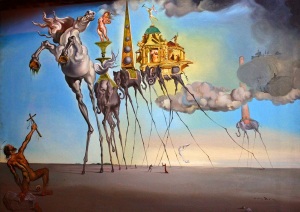
Ὁ δὲ μισόκαλος καὶ φθονερὸς διάβολος οὐκ ἤνεγκεν ὁρῶν ἐν νεωτέρῳ τοιαύτην πρόθεσιν. Ἀλλ’ οἷα μεμελέτηκε ποιεῖν, ἐπιχειρεῖ καὶ κατὰ τούτου πράττειν· καὶ τὸ μὲν πρῶτον ἐπείραζεν αὐτὸν ἀπὸ τῆς ἀσκήσεως καταγαγεῖν, ὑποβάλλων μνήμην τῶν κτημάτων, τῆς ἀδελφῆς τὴν κηδεμονίαν, τοῦ γένους τὴν οἰκειότητα, φιλαργυρίαν, φιλοδοξίαν, τροφῆς τὴν ποικίλην ἡδονήν, καὶ τὰς ἄλλας ἀνέσεις τοῦ βίου, καὶ τέλος τὸ τραχὺ τῆς ἀρετῆς, καὶ ὡς πολὺς αὐτῆς ἐστιν ὁ πόνος· τοῦ τε σώματος τὴν ἀσθένειαν ὑπετίθετο, καὶ τοῦ χρόνου τὸ μῆκος. καὶ ὅλως πολὺν ἤγειρεν αὐτῷ κονιορτὸν λογισμῶν ἐν τῇ διανοίᾳ, θέλων αὐτὸν ἀποσχοινίσαι τῆς ὀρθῆς προαιρέσεως. ὡς δὲ εἶδεν ἑαυτὸν ὁ ἐχθρὸς ἀσθενοῦντα πρὸς τὴν τοῦ Ἀντωνίου πρόθεσιν, καὶ μᾶλλον ἑαυτὸν καταπαλαιόμενον ὑπὸ τῆς ἐκείνου στερρότητος, καὶ ἀνατρεπόμενον τῇ πολλῇ πίστει, καὶ πίπτοντα ταῖς συνεχέσιν Ἀντωνίου προσευχαῖς· τότε δὴ τοῖς ἐπ’ ὀμφαλοῦ γαστρὸς ὅπλοις ἑαυτοῦ θαρρῶν, καὶ καυχώμενος ἐπὶ τούτοις (ταῦτα γάρ ἐστιν αὐτοῦ τὰ πρῶτα κατὰ τῶν νεωτέρων ἔνεδρα), προσέρχεται κατὰ τοῦ νεωτέρου, νυκτὸς μὲν αὐτὸν θορυβῶν, μεθ’ ἡμέραν δὲ οὕτως ἐνοχλῶν, ὡς καὶ τοὺς ὁρῶντας αἰσθέσθαι τὴν γινομένην ἀμφοτέρων πάλην. Ὁ μὲν γὰρ ὑπέβαλλε λογισμοὺς ῥυπαρούς, ὁ δὲ ταῖς εὐχαῖς ἀνέτρεπε τούτους· καὶ ὁ μὲν ἐγαργάλιζεν, ὁ δέ, ὡς ἐρυθριᾷν δοκῶν, τῇ πίστει καὶ ταῖς εὐχαῖς καὶ νηστείαις ἐτείχιζε τὸ σῶμα· καὶ ὁ μὲν διάβολος ὑπέμενεν ὁ ἄθλιος καὶ ὡς γυνὴ σχηματίζεσθαι νυκτός, καὶ πάντα τρόπον μιμεῖσθαι, μόνον ἵνα τὸν Ἀντώνιον ἀπατήσῃ· ὁ δὲ τὸν Χριστὸν ἐνθυμούμενος, καὶ τὴν δι’ αὐτὸν εὐγένειαν, καὶ τὸ νοερὸν τῆς ψυχῆς λογιζόμενος, ἀπεσβέννυε τὸν ἄνθρακα τῆς ἐκείνου πλάνης.
(Athanasius, Vita Antonii 5)
But the devil, who hates and envies what is good, could not endure to see such a resolution in a youth, but endeavoured to carry out against him what he had been wont to effect against others. First of all he tried to lead him away from the discipline, whispering to him the remembrance of his wealth, care for his sister, claims of kindred, love of money, love of glory, the various pleasures of the table and the other relaxations of life, and at last the difficulty of virtue and the labour of it; he suggested also the infirmity of the body and the length of the time. In a word he raised in his mind a great dust of debate, wishing to debar him from his settled purpose. But when the enemy saw himself to be too weak for Antony’s determination, and that he rather was conquered by the other’s firmness, overthrown by his great faith and falling through his constant prayers, then at length putting his trust in the weapons which are ‘in the navel of his belly’ and boasting in them— for they are his first snare for the young— he attacked the young man, disturbing him by night and harassing him by day, so that even the onlookers saw the struggle which was going on between them. The one would suggest foul thoughts and the other counter them with prayers: the one fire him with lust, the other, as one who seemed to blush, fortify his body with faith, prayers, and fasting. And the devil, unhappy wight, one night even took upon him the shape of a woman and imitated all her acts simply to beguile Antony. But he, his mind filled with Christ and the nobility inspired by Him, and considering the spirituality of the soul, quenched the coal of the other’s deceit. (tr. Henry Ellershaw)
